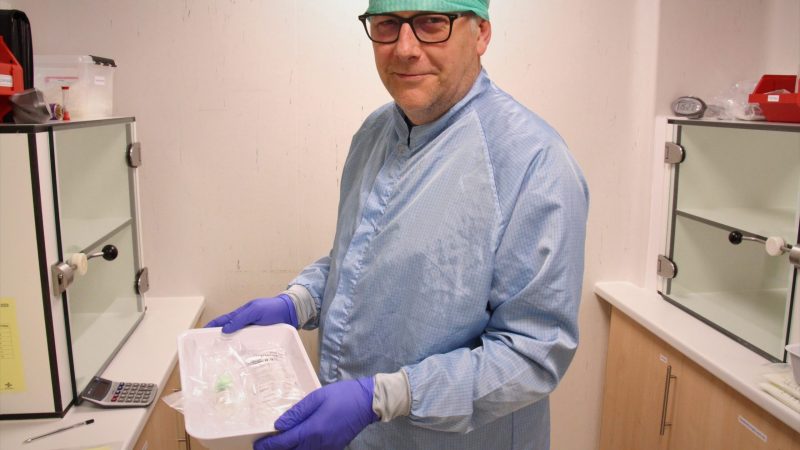
‘I’m sorry to say you have cancer’ is a diagnosis no one ever wants to receive.
But with today’s advanced treatments and medication, survival rates for many cancers have never been better.
However, many people do not realise some of the most effective chemotherapy drugs are produced right here in Teesside.
The University Hospital of North Tees’ pharmacy aseptic team’s highly skilled pharmacists, technicians and assistants work tirelessly to create life-saving chemotherapy drugs. They use the most-up-to-date equipment and expensive, sometimes dangerous, chemical compounds, adhering to very strict processes and safety regulations.
Making chemotherapy drugs is a complex, rigorous business.
Associate Chief Pharmacist for Aseptic Services Bill Wetherill leads the team manufacturing the drugs. He explains: “’Aseptic’ means ‘prepared sterile’”.
“Chemotherapy reduces the immune system which relies on healthy cell division, so we have to be very careful to ensure everything is perfectly clean and sterile at all times to minimise contamination.
“The whole system is completely process-led. There is no room for improvisation or guess work. There is a prescribed way to do everything.”
Bill Wetherill
How the drugs are made in-house
Even entering the aseptic unit support room, where the various drugs are laid out ready to be mixed, requires a precise method of disrobing and changing into clean medical scrubs, shoes, a disposable hat and sterile gloves.
In the aseptic unit support room, which has curved corners to allow for thorough cleaning, pharmacy assistants ensure the right chemicals are prepared for the operator to mix in precise quantities to make each chemotherapy regime as required for each particular patient.
The operators, who mix the drugs in precise measurements, are next door in a room even more sterile, visible through a window.
The assistant assembles the drugs, with the prescription and any required equipment, in a small tray. The tray is then sprayed with decontamination chemicals and put into an airlock with an egg timer.
On the other side of the airlock, sits the operator, waiting patiently until the egg timer lets her know two minutes have passed. Any bugs on the surface of the drug vials or tray are now dead.
Working swiftly but with clear purpose, the operator, working within a sterile laminar flow cabinet, carefully measures out the required amount of each drug and mixes them as per the prescription’s requirements.
A painstaking process
So thorough are the processes in place, that petri dishes placed in the preparation room are sent for analysis to provide assurance that no germs were present during the mixing process.
Bill explains how the air pressure in the sterile rooms has to be carefully monitored to be slightly higher than usual. “It constantly pushes the air out, taking any airborne particles and microbes with it.”
Once the regime has been mixed, the operator puts it back in the tray, and places the tray in the airlock back to the support room.
After two minutes has passed, the assistant takes the tray for Bill to check and ensure the correct product at the correct dose has been mixed for the patient.
This process is then repeated again and again.
Dozens of chemotherapy doses custom-made every week
The team makes approximately 280 chemotherapy doses, often combined into what is called a ‘regime’, every week. With some doses costing up to £10,000, all are mixed to-order, as detailed on the prescription ordered by the consultant.
Some of these drugs only have a shelf life of 30 minutes and are not prepared until the team are notified the patient is in the hospital and waiting for their treatment.
“Rewarding” is Bill’s understated response to being asked what it’s like to spend a career making life-saving drugs.
He has high praise for his team of ten calling them ‘incredible’ which in the past have made chemotherapy regimens for colleagues and friends with cancer.
Mixing chemotherapy drugs is one of many services people may be surprised to learn takes place on their doorstep. Under Bill Wetherill’s guidance, the committed team of expert pharmacists, technicians and assistants will continue to play their part in saving lives.
